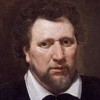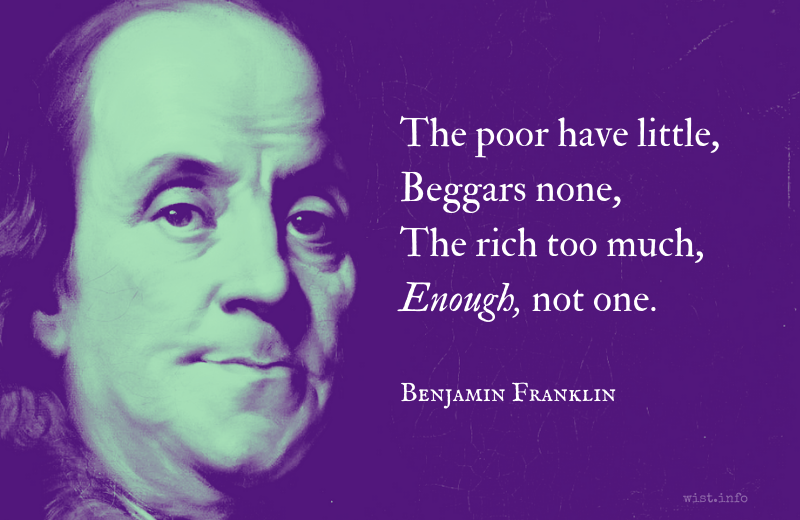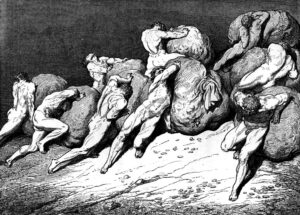Quotations about:
money
Note not all quotations have been tagged, so Search may find additional quotes on this topic.
He does not possess Wealth, it possesses him.
Benjamin Franklin (1706-1790) American statesman, scientist, philosopher, aphorist
Poor Richard (1734 ed.)
(Source)
He called to mind all the millionaires he had ever read or heard of; they didn’t seem to get much fun out of their riches. The majority of them were martyrs to dyspepsia. They were often weighed down by the cares and responsibilities of their position; the only people who were unable to obtain an audience of them at any time were their friends; they lived in a glare of publicity, and every post brought them hundreds of begging letters, and a few threats; their children were in constant danger from kidnappers, and they themselves, after knowing no rest in life, could not be certain that even their tombs would be undisturbed. Whether they were extravagant or thrifty, they were equally maligned, and, whatever the fortune they left behind them, they could be absolutely certain that, in a couple of generations, it would be entirely dissipated.
F. Anstey (1856-1934) English novelist and journalist (pseud. of Thomas Anstey Guthrie)
The Brass Bottle, ch. 7 (1900)
(Source)
There are two times in a man’s life when he should not speculate: when he can’t afford it, and when he can.
Mark Twain (1835-1910) American writer [pseud. of Samuel Clemens]
Following the Equator, ch. 56, epigraph (1897)
(Source)
To what extremes, O cursèd lust for gold
will you not drive man’s appetite?
[Per che non reggi tu, o sacra fame
de l’oro, l’appetito de’ mortali?]Dante Alighieri (1265-1321) Italian poet
The Divine Comedy [Divina Commedia], Book 2 “Purgatorio,” Canto 22, l. 40ff (22.40-41) [Statius] (1314) [tr. Musa (1981)]
(Source)
Statius is quoting Virgil (whose shade stands in front of him) from The Aeneid, Book 3, ll. 56-57:
Quid non mortalia pectora cogis,
Auri sacra fames?
Unlike the phrase in that pagan book, which is purely about the corrupting power of greed and gold-lust, Dante's Italian and some translators make reference to a "holy hunger," a virtue/rule of proper attitude toward money and spending, criticized here for it not restraining humans from the sins of being either spendthrifts or misers -- a nod to Aristotle making sin about extremes and virtue about moderation. See Ciardi, Durling, Kirkpatrick, Princeton, and Sayers for more discussion.
(Source (Italian)). Alternate translations:
Why, thou cursed thirst
Of gold! dost not with juster measure guide
The appetite of mortals?
[tr. Cary (1814)]
Why should'st thou not restrain accursèd thirst
Of gold, the appetite of mortals lost?
[tr. Bannerman (1850)]
To what impellest thou not, O cursed hunger
Of gold, the appetite of mortal men?
[tr. Longfellow (1867)]
Why restrainest thou not, O holy hunger of gold, the desire of mortals?
[tr. Butler (1885)]
To what lengths, O thou cursed thirst of gold,
Dost thou not rule the mortal appetite?
[tr. Minchin (1885)]
O cursed hunger of gold, to what dost thou not impel the appetite of mortals?
[tr. Norton (1892)]
Wherefore dost thou not regulate the lust of mortals, O hallowed hunger of gold?
[tr. Okey (1901)]
To what, O cursed hunger for gold, dost thou not drive the appetite of mortals?
[tr. Sinclair (1939)]
O hallowed hunger of gold, why dost thou not
The appetite of mortal men control?
[tr. Binyon (1943)]
With what constraint constran'st thou not the lust
Of mortals, thou devoted greed of gold!
[tr. Sayers (1955)]
To what do you not drive man's appetite,
O cursèd gold-lust!
[tr. Ciardi (1961)]
Why do you not control the appetite
Of mortals, O you accurst hunger for gold?
[tr. Sisson (1981)]
Why cannot you, o holy hunger
for gold, restrain the appetite of mortals?
[tr. Mandelbaum (1982)]
O sacred hunger for gold, why do you not rule human appetite?
[tr. Kline (2002)]
Why do you, O holy hunger for gold, not
govern the appetite of mortals?
[tr. Durling (2003)]
You, awestruck hungering for gold! Why not
impose a rule on mortal appetite?
[tr. Kirkpatrick (2007)]
To what end, O cursèd hunger for gold,
do you not govern the appetite of mortals?
[tr. Hollander/Hollander (2007)]
Accursed craving for money, what is there, in
This world, you don't lead human beings to?
[tr. Raffel (2010)]
Speak not of wealth; I can’t admire a god
whom even the basest man can get into his hold.Euripides (485?-406? BC) Greek tragic dramatist
Æolus [Αἴολος], frag. 20 (TGF)
(Source)
Nauck frag. 20, Barnes frag. 15, Musgrave frag. 14. (Source (Greek)). Alternate translations:
Talk not of Plutus; I despise the God
Whom every villain may with ease possess.
[tr. Wodhull (1809)]
Why, if all the rich men in the world divided up their money amongst themselves, there wouldn’t be enough to go round!
Christina Stead (1902-1983) Australian writer
House of All Nations, sc. 12 “The Revolution” [Jules] (1938)
(Source)
Pooh-poohing the idea that confiscating wealth from the rich would provide enough money to the poor. The line is also included in the "Credo" at the beginning of the novel, attributed to the character, Jules Bertillon.
ANNAS: Your help in this matter won’t go unrewarded.
CAIAPHAS: We’ll pay you in silver — cash on the nail.
We just need to know where the soldiers can find him.ANNAS: With no crowd around him.
CAIAPHAS:Then we can’t fail.
JUDAS: I don’t need your blood money!
CAIAPHAS: Oh, that doesn’t matter, our expenses are good.
JUDAS: I don’t want your blood money!
ANNAS: But you might as well take it. We think that you should.
CAIAPHAS: Think of the things you could do with that money,
Choose any charity — give to the poor.
We’ve noted your motives — we’ve noted your feelings.
This isn’t blood money — it’s a fee, nothing —
Fee, nothing — fee, nothing more.Tim Rice (b. 1944) British lyricist and author
Jesus Christ Superstar, “Blood Money” (1970) [music by Andrew Lloyd Webber]
(Source)
(Source (audio))
The movie version reverses the order of "need" and "want your blood money." It also turns the last lines into a brief interchange between Caiaphas and Annas:
CAIAPHAS: This isn't isn't blood money -- it's ...
ANNAS: A fee.
CAIAPHAS: A fee, nothing more.
What Nature wants, commodious Gold bestows,
‘Tis thus we eat the bread another sows:
But how unequal it bestows, observe,
‘Tis thus we riot, while who sow it, starve.
What Nature wants (a phrase I much distrust)
Extends to Luxury, extends to Lust;
And if we count among the Needs of life
Another’s Toil, why not another’s Wife?
Useful, we grant, it serves what life requires,
But dreadful too, the dark Assassin hires:
Trade it may help, Society extend;
But lures the Pyrate, and corrupts the Friend:
It raises Armies in a nation’s aid,
But bribes a Senate, and the Land’s betray’d.Alexander Pope (1688-1744) English poet
“An Epistle to Allen, Lord Bathurst: Of the Use of Riches” (1733), Moral Essays, Epistle 3 (1735)
(Source)
Earthly riches can neither bless us nor our children with happiness; we must either lose them in this life or leave them to be enjoyed after our death by one, we cannot tell whom, perhaps by those we would not should have them.
[Felices enim uel nos uel filios nostros non diuitiae terrenae faciunt aut nobis uiuentibus amittendae aut nobis mortuis a quibus nescimus uel forte a quibus nolumus possidendae.]Augustine of Hippo (354-430) Christian church father, philosopher, saint [b. Aurelius Augustinus]
City of God [De Civitate Dei], Book 5, ch. 18 (5.18) (AD 412-416) [tr. Healey (1610)]
(Source)
(Source (Latin)). Alternate translations:
For it is not earthly riches which make us or our sons happy; for they must either be lost by us in our lifetime, or be possessed when we are dead, by whom we know not, or perhaps by whom we would not.
[tr. Dods (1871)]
The riches of this earth can make neither us nor our children happy, if they are to be lost while we are alive or, after we are dead, are to pass to people we do not know or, perhaps, dislike.
[tr. Zema/Walsh (1950)]
For neither we nor our children are made happy by earthly riches, since they are bound either to be lost while we are living or to be acquired after our death by persons unknown and perhaps unwelcome.
[tr. Green (Loeb) (1963)]
Happiness, whether for us or for our children, is not the result of earthly riches, which must either be lost by us in our lifetime or else must pass after our death into the possession of those we do not know or, it may be, of those whom we do not wish to have them.
[tr. Bettenson (1972)]
For neither we nor our sons are made happy by earthly riches. These things must either be lost while we are still alive or, after we are dead, acquired by someone whom we do not know, or perhaps by someone whom we would not wish to have them.
[tr. Dyson (1998)]
For earthly riches do not make either us or our children happy; they will either be lost while we are still alive or will pass, after our death, to someone we do not know or even to someone we do not want.
[tr. Babcock (2012)]
Well, it’s no trick to make a lot of money — if all you want to do is make a lot of money.
Joseph Mankiewicz (1909-1993) American screenwriter, director, producer
Citizen Kane [Mr. Bernstein] (1941) [with Orson Welles]
(Source)
Whilst that for which all virtue now is sold,
And almost every vice, almighty gold ….Ben Jonson (1572-1637) English playwright and poet
“Epistle to Elizabeth, Countess of Rutland” (1599)
(Source)
Reprinted in The Forest, Poem 12.
Thou art an heyre to fayre lyving, that is nothing, if thou be disherited of learning, for better were it to thee to inherite righteousnesse then riches, and far more seemely were it for thee to have thy Studie full of bookes, then thy pursse full of mony: to get goods is the benefit of Fortune, to keepe them the gift of Wisedome.
[Thou art an heir to fair living; that is nothing if thou be disinherited of learning, for better were it to thee to inherit righteousness than riches and far more seemly were it for thee to have thy study full of books than thy purse full of money. To get goods is the benefit of fortune, to keep them the gift of wisdom. (1916 ed.)]John Lyly (c. 1553-1606) was an English writer [also Lilly or Lylie]
Euphues: The Anatomy of Wit, “Letter to Alcius” (1579)
(Source)
If there’s no money in poetry, neither is there poetry in money.
Robert Graves (1895-1985) English poet, novelist, critic
“Mammon,” lecture, London School of Economics and Political Science (1963-12-06)
(Source)
Reprinted in Mammon and the Black Goddess (1965).
Whoever said money can’t solve your problems must not have had enough money to solve them.
Ariana Grande (b. 1993) American singer, songwriter, actress
“7 Rings”, Thank U, Next (2018)
(Source)
The least vile of all merchants is he who says: “Let us be virtuous, since, thus, we shall gain much more money than the fools who are dishonest.” For the merchant, even honesty is a financial speculation.
[Le moins infâme de tous les commerçants, c’est celui qui dit: Soyons vertueux pour gagner beaucoup plus d’argent que les sots qui sont vicieux. — Pour le commerçant, l’honnêteté elle-même est une spéculation de lucre.]
Charles Baudelaire (1821-1867) French poet, essayist, art critic
Journaux Intimes [Intimate Journals], “Mon cœur mis à nu [My Heart Laid Bare],” § 47 (1864–1867; pub. 1887) [tr. Isherwood (1930)]
(Source)
(Source (French)). Alternate translation:
The least despicable of merchants is the one who says: Let us be virtuous so that we can make far more money than those vice-ridden fools. -- For the merchant, even honesty offers a money-making opportunity.
[tr. Sieburth (2022)]
The world runs on from one folly to another; and the man who, solely from regard to the opinion of others, and without any wish or necessity of his own, toils after gold, honour, or any other phantom, is no better than a fool.
[Alles in der Welt läuft doch auf eine Lumperei hinaus, und ein Mensch, der um anderer willen, ohne daß es seine eigene Leidenschaft, sein eigenes Bedürfnis ist, sich um Geld oder Ehre oder sonst was abarbeitet, ist immer ein Tor.]
Johann Wolfgang von Goethe (1749-1832) German poet, statesman, scientist
Die Leiden des Jungen Werthers [The Sorrows of Young Werther], Book 1, “July 20” (1774) [tr. Boylen (1854)]
(Source)
(Source (German)). Alternate translation:
A man who works at another’s will, not for his own passion or his own need, but for money or honor, is always a fool.
[tr. 1779]
How deep is evil rooted in the breasts
Of all men! tho’ our pardon we extend not
To him, who, grasping at some great reward,
Becomes a sinner: yet since, in proportion
As he grows boldly profligate, he reaps
Greater advantages, he with more ease
The world’s reproachful language may sustain.[ὡς ἔμφυτος μὲν πᾶσιν ἀνθρώποις κάκη”
ὅστις δὲ πλεῖστον μισϑὸν εἰς χεῖρας λαβὼν
κακὸς γένηται, τῷδε συγγνώμη μὲν οὔ,
πλείω δὲ μισϑὸν μείζονος τόλμης ἔχων
τὸν τῶν λεγόντων ῥᾷον ἂν φέροι Ῥόγον.]Euripides (485?-406? BC) Greek tragic dramatist
Bellerophon [Βελλεροφῶν], frag. 297 (TGF) (c. 430 BC) [tr. Wodhull (1809)]
(Source)
Nauck frag. 299. Barnes frag. 44, Musgrave frag. 9. (Source (Greek)). Alternate translations:
All men have badness in their natures! The one who takes most pay into his hands, and proves bad, gets no pardon; but if he has more pay for greater audacity, he'll endure censorious talk more easily.
[tr. Collard, Hargreaves, Cropp (1995)]
There is evil in all men. Whoever gets his hands on good money and is seen to be wicked, he is roundly condemned. But if he were yet more daring, gaining even greater reward, he would have less of a problem enduring being criticized by others.
[tr. Stevens (2012)]
Money is only a tool in business. It is just a part of the machinery. You might as well borrow 100,000 lathes as $100,000 if the trouble is inside your business. More lathes will not cure it; neither will more money. Only heavier doses of brains and thought and wise courage can cure. A business that misuses what it has will continue to misuse what it can get.
Henry Ford (1863-1947) American industrialist
My Life and Work, ch. 11 “Money and Goods” (1922) [with Samuel Crowther]
(Source)
Money was made, not to command our Will,
But all our lawful pleasures to fulfil.
Shame and Woe to us, if we our Wealth obey;
The Horse doth with the Horseman run away.Abraham Cowley (1618-1667) English poet and essayist
“Paraphrase upon the 10th Epistle of the First Book of Horace,” l. 75ff.
(Source)
Where large sums of money are concerned, it is advisable to trust nobody.
A man wants to earn money in order to be happy, and his whole effort and the best of a life are devoted to the earning of that money. Happiness is forgotten; the means are taken for the end.
Albert Camus (1913-1960) Algerian-French novelist, essayist, playwright
The Myth of Sisyphus, “Absurd Creation” (1942) [tr. O’Brien (1991)]
(Source)
Plato said that virtue has no master. If a person does not honor this principle and rejoice in it, but is purchasable for money, he creates many masters for himself.
Apollonius of Tyana (c. AD 15-100) Greek philosopher and religious leader [Ἀπολλώνιος]
Letters from Apollonius of Tyana, ep. 15, Letter to Euphrates [tr. Jones (2006)]
(Source)
The reference to Plato's Republic, X 617 E.
If you make money your god, it will plague you like the devil.
(Other Authors and Sources)
English proverb
Sometimes "'twill plague you".
An anonymous proverb, recorded in Thomas Fielding, ed., Select Proverbs of All Nations (1824). Thomas Fielding was the pseudonym of John Wade (1788-1875), a British journalist and author.
Though Fielding was only a compiler of proverbs and aphorisms, the quotation then shows up in a variety of collections later in the 19th Century actually cited to "Fielding," e.g., H. Southgate, ed., Many Thoughts of Many Minds (1862); John Camden Hotten, ed. The Golden Treasury of Thought (1873); Edward Parsons Day, ed., Day's Collacon: an Encyclopaedia of Prose Quotations (1884).
In relatively short order, this "Fielding" then became conflated with the more famous English writer Henry Fielding (1707-1754), to whom this quotation is often credited.
Preoccupation with money is the great test of small natures, but only a small test of great ones; there may be a wide gulf between a man who despises money and a genuinely honest man.
[L’intérêt d’argent est la grande épreuve des petits caractères; mais ce n’est encore que la plus petite pour les caractères distingués; et il y a loin de l’homme qui méprise l’argent, à celui qui est véritablement honnête.]
Nicolas Chamfort (1741-1794) French writer, epigrammist (b. Nicolas-Sébastien Roch)
Products of Perfected Civilization [Produits de la Civilisation Perfectionée], Part 1 “Maxims and Thoughts [Maximes et Pensées],” ch. 2, ¶ 164 (1795) [tr. Mathers (1926)]
(Source)
(Source (French)). Alternate translations:
Concern for money is the great test of small natures; but is scarcely a test at all for those who rise above the ordinary; and there is a long way between the man who scorns money and the one who is genuinely honest.
[tr. Merwin (1969)]
Weak characters think money all-important; for any well-bred person, it's a very minor concern.
[tr. Parmée (2003), ¶ 129]
The desire for money can go very far in proving that a person has a petty character, but it has little to say about a persons sincerity; and there is a great distance between a man who scorns money and someone who is truly honest.
[tr. Siniscalchi]
You can be young without money but you can’t be old without it. You’ve got to be old with money because to be old without it is just too awful, you’ve got to be one or the other, either young or with money, you can’t be old and without it.
Tennessee Williams (1911-1983) American playwright
Cat on a Hot Tin Roof, Act 1 [Margaret] (1955)
(Source)
Money never remains just coins and pieces of paper. Money can be translated into the beauty of living, a support in misfortune, an education, or future security. It also can be translated into a source of bitterness.
Sylvia Porter (1913-1991) American economist, journalist, author
Sylvia Porter’s Money Book, Part 1, ch. 1 (1975)
(Source)
Money is always on its way somewhere; we are only a way station. What we do with it while it’s in our keeping will say much about us — as will the direction it takes after we speed it on its way.
Money poisons you when you’ve got it, and starves you when you haven’t.
David Herbert "D. H." Lawrence (1885-1930) English novelist
Lady Chatterley’s Lover, ch. 19 [Mellors] (1928)
(Source)
You don’t seem to realize that a poor person who is unhappy is in a better position than a rich person who is unhappy. Because the poor person has hope. He thinks money would help. I tell you there is no despair like the despair of the man who has everything.
Jean Kerr (1922-2003) American author and playwright [b. Bridget Jean Collins]
Poor Richard, Act 1 [Sydney] (1963)
(Source)
Money is a singular thing. It ranks with love as man’s greatest source of joy. And with death as his greatest source of anxiety.
John Kenneth Galbraith (1908-2006) Canadian-American economist, diplomat, author
The Age of Anxiety, ch. 6 “The Rise and Fall of Money” (1977)
(Source)
Ah, Constantine! what mischief in the gift —
Not thy conversion, but the dower you gave
For the first wealthy Father to receive.[Ahi, Costantin, di quanto mal fu matre,
non la tua conversion, ma quella dote
che da te prese il primo ricco patre!]Dante Alighieri (1265-1321) Italian poet
The Divine Comedy [Divina Commedia], Book 1 “Inferno,” Canto 19, l. 115ff (9.115-117) [Dante] (1309) [tr. Bannerman (1850)]
(Source)
According to legend, the Emperor Constantine, having been cured of leprosy through baptism by Pope Sylvester, both showered Sylvester with riches and moved his own capital to Constantinople, leaving the Pope as temporal ruler of the West. This "Donation of Constantine" was fabricated in the 8th century, and first used by Pope Adrian I to encourage Charlemagne to give generously and acknowledge papal power over the emperor. It was largely believed true until the 15th Century. Dante, both author and character, traced the Church's corruption by power and wealth from that legend.
(Source (Italian)). Alternate translations:
Ah! Constantine, of how much ill was Cause
Not thy Conversion, but those rich Domains
That the first wealthy Pope received of thee!
[tr. Milton (1641)]
Ah, Constantine, what are the many Ills
You have been parent of: I do not mean
By your Conversion, but that pompous Gift
By which our Holy Father you enrich'd!
[tr. Rogers (1782), l. 112ff]
Lamented ever be that lib'ral hand,
Whose gifts allur'd the Apostolic band
To leave that humble path where long they trod.
[tr. Boyd (1802), st. 19]
Ah, Constantine! to how much ill gave birth,
Not thy conversion, but that plenteous dower,
Which the first wealthy Father gain’d from thee!
[tr. Cary (1814)]
Ah, Constantine! what ills have we to rue --
I say not from thine own conversion sprung,
But from thy dower, the first rich father drew!
[tr. Dayman (1843)]
Ah Constantine! to how much ill gave birth, not thy conversion, but that dower which the first rich Father took from thee!
[tr. Carlyle (1849)]
Oh, Constantine, of how much ill the source!
Not thy conversion, but that fatal dower
Which the first Father took from the in gift!
[tr. Johnston (1867)]
Ah, Constantine! of how much ill was mother,
Not thy conversion, but that marriage-dower
Which the first wealthy Father took from thee!
[tr. Longfellow (1867)]
Ah, Constantine, of how great ill was mother, not thy conversion, but that dowry which the first rich pope got from thee!
[tr. Butler (1885)]
Ah, Constantine, of how much ill was cause,
Not thy conversion but the fatal dower
Which the first wealthy father from thee draws!
[tr. Minchin (1885)]
Ah Constantine! of how much ill was mother, not thy conversion, but that dowry which the first rich Father received from thee!
[tr. Norton (1892)]
Ah! Constantine, of how great ill was mother,
Not thy conversion, but that fatal dowry,
Which from thy hands received the first rich Father.
[tr. Griffith (1908)]
Ah, Constantine, of how much evil gave birth,
not thy conversion, but that dower
the first rich Father had from thee.
[tr. Sinclair (1939)]
Ah, Constantine, what evil fruit did bear
Not they conversion, but that dowry broad
Thou on the first rich Father didst confer!
[tr. Binyon (1943)]
Ah, Constantine! What ills were gendered there --
No, not from thy conversion, but the dower
The first rich Pope received from thee as heir?
[tr. Sayers (1949)]
Ah Constantine, what evil marked the hour --
not of your conversion, but of the fee
the first rich Father took from you in dower!
[tr. Ciardi (1954)]
Ah, Constantine, of how much ill was mother, not your conversion, but that dowry which the first rich Father took from you!
[tr. Singleton (1970)]
Oh, Constantine, what evil did you sire,
not by your conversion, but by the dower
that the first wealthy Father got from you!
[tr. Musa (1971)]
Ah, Constantine, what wickedness was born --
and not from your conversion -- from the dower
that you bestowed upon the first rich father!
[tr. Mandelbaum (1980)]
Ah, Constantine, how much ill you produced,
Not by your conversion, but by that endowment
Which the first rich father accepted from you.
[tr. Sisson (1981)]
Ah Constantine! What measure of wickedness
Stems from that mother -- not your conversion, I mean:
Rather the dowry that the first rich Father
Accepted from you!
[tr. Pinsky (1994), l. 108ff]
Ah, Constantine, not your conversion, but that dowry which the first rich father took from you, has been the mother of so much evil!
[tr. Durling (1996)]
Ah, Constantine, how much evil you gave birth to, not in your conversion, but in that Donation that the first wealthy Pope, Sylvester, received from you!
[tr. Kline (2002)]
What harm you mothered, Emperor Constantine!
Not your conversion but the dowry he --
that first rich Papa -- thus obtained from you!
[tr. Kirkpatrick (2006)]
Ah, Constantine, to what evil you gave birth,
not by your conversion, but by the dowry
that the first rich Father had from you!
[tr. Hollander/Hollander (2007)]
Ah, Constantine, the evil thrown in the world
Was not your conversion to Christ, but the wealth and grandeur
The first rich Pope and Father took from your hands!
[tr. Raffel (2010)]
Constantine! You set the spurs
To evil, not by cleaving to your new
Religion, but by how, when you moved east,
You gave Sylvester, just to stay behind,
The Western Empire's wealth.
[tr. James (2013)]
Gold and silver are the gods you adore
In what are you different from the idolater,
save that he worships one, and you a score?[Fatto v’avete dio d’oro e d’argento;
e che altro è da voi a l’idolatre,
se non ch’elli uno, e voi ne orate cento?]Dante Alighieri (1265-1321) Italian poet
The Divine Comedy [Divina Commedia], Book 1 “Inferno,” Canto 19, l. 112ff (19.112-114) [Dante] (1309) [tr. Ciardi (1954)]
(Source)
Chiding the damned shade of Pope Nicholas III (reigned 1280-1303), who was infamous for his corruption, extorting lands for the Church from nobles before giving his blessing, taking bribes, and selling holy offices (simonism); the last has landed him in the Eighth Circle, third Bolgia, with the other simoniacs.
(Source (Italian)). Alternate translations:
But you of silver and gold have made
Your God: What differs your Idolatry
From that of others, but that they did one
Alone, and you a hundred Gods adore.
[tr. Rogers (1782), l. 109ff]
Go, seek your Saviour in the delved mine.
And bid the Idolater the palm resign;
Thine is a Legion, his a single God!
[tr. Boyd (1802), st. 19]
Of gold and silver ye have made your god,
Diff’ring wherein from the idolater,
But he that worships one, a hundred ye?
[tr. Cary (1814)]
Silver and gold ye make your god: what more
Divides the brute idolater and you,
Save that he one, a hundred ye adore?
[tr. Dayman (1843)]
Ye have made you a god of gold and silver; and wherein do ye differ from the idolater, save that he worships one, and ye a hundred?
[tr. Carlyle (1849)]
Of gold and silver you have made your god,
Idols of yours and others to recount,
Theirs to one, to a hundred yours amount.
[tr. Bannerman (1850)]
Or gold and silver ye your gods have made;
And what is 'twist th' idolater and you,
But he to one -- ye to a hundred pray.
[tr. Johnston (1867)]
Ye have made yourselves a god of gold and silver;
And from the idolater how differ ye,
Save that he one, and ye a hundred worship?
[tr. Longfellow (1867)]
Ye have made a god of gold and silver, and what else is there between you and the idolater save that he worships one, and you a hundred.
[tr. Butler (1885)]
Ye've made your God of silver and of gold.
Ye from idolaters what line withdraws.
Save they sin once, and ye a hundredfold?
[tr. Minchin (1885)]
Ye have made you a god of gold and silver: and what difference is there between you and the idolater save that he worships one and ye a hundred?
[tr. Norton (1892)]
A god ye have made yourselves of gold and silver,
And from idolaters what else divides you,
Save that they pray to one and you a hundred?
[tr. Griffith (1908)]
You have made you a god of gold and silver, and what is there between you and teh idolaters but that they worship one and you a hundred?
[tr. Sinclair (1939)]
A God of silver and gold ye have made to adore;
And how do ye differ from the idolater
Sav e that he worships one, and ye five-score?
[tr. Binyon (1943)]
You deify silver and gold; how are you sundered
In any fashion from the idolater,
Save that he serves one god and you an hundred?
[tr. Sayers (1949)]
You have made you a god of gold and silver; and wherein do you differ from the idolaters, save that they worship one, and you a hundred?
[tr. Singleton (1970)]
You have built yourselves a God of gold and silver!
How do you differ from the idolater,
except he worships one, you worship hundreds?
[tr. Musa (1971)]
You’ve made yourselves a god of gold and silver;
how are you different from idolaters,
save that they worship one and you a hundred?
[tr. Mandelbaum (1980)]
You have made a god of gold and silver:
And how do you differ from an idolater,
Except that he prays to one, and you to a hundred?
[tr. Sisson (1981)]
You made a god of gold and silver: wherein
Is it you differ from the idolatrous --
Save that you worship a hundred, they but one?
[tr. Pinsky (1994), l. 105ff]
You have made gold and silver your god; and what difference is there between you and the idol-worshipper, except that he prays to one, and you to a hundred?
[tr. Durling (1996)]
You have made a god for yourselves of gold and silver, and how do you differ from the idolaters, except that he worships one image and you a hundred?
[tr. Kline (2002)]
Silver and gold you have made your god. And what’s
the odds -- you and some idol-worshipper?
He prays to one, you to a gilded hundred.
[tr. Kirkpatrick (2006)]
You have wrought yourselves a god of gold and silver.
How then do you differ from those who worship idols
except they worship one and you a hundred?
[tr. Hollander/Hollander (2007)]
The god you made for yourself is silver and gold --
And where are you different, you and worshippers
Of idols? They have one, and you a hundred.
[tr. Raffel (2010)]
You thieves reigned,
Making a God of gold and silver. Room
Does not exist between the idolaters
And you, except they worship one, and you
A hundred.
[tr. James (2013)]
Learn how to cook! That’s my invariable answer when I am asked to give forth with money-saving recipes, economy tips, budget gourmet dinner menus for six people under ten dollars, and the like. Learn how to cook! That’s the way to save money. You don’t save it buying hamburger helpers, and prepared foods; you save it buying fresh foods in season or in large supply, when they are cheapest and usually best, and you prepare them from scratch at home. Why pay for someone else’s work, when if you know how to do it, you can save all that money for yourself? Knowing how to do it also means doing it fast, and preparing parts of a dish or a meal whenever you have a spare moment in the kitchen. That way, cooking well doesn’t take a great deal of time, and when you cook well, you’ll be eating far better meals than you could buy from the freezer, or at a restaurant.
Julia Child (1912-2004) American chef and writer
Julia Child’s Kitchen, Introduction (1975)
(Source)
And is it not the chief good of money, the being free from the need of thinking of it?
As my father used to say: “There are two sure ways to lose a friend, one is to borrow, the other to lend.”
Patrick Rothfuss (b. 1973) American author
The Name of the Wind, ch. 49 “The Nature of Wild Things” (2007)
(Source)
You now can see, dear son, the short-lived pranks
that goods consigned to Fortune’s hand will play,
causing such squabbles in the human ranks.
For all the gold that lies beneath the moon —
or all that ever did lie there — would bring
no respite to these worn-out souls, not one.[Or puoi, figliuol, veder la corta buffa
d’i ben che son commessi a la fortuna,
per che l’umana gente si rabuffa;
ché tutto l’oro ch’è sotto la luna
e che già fu, di quest’anime stanche
non poterebbe farne posare una.]Dante Alighieri (1265-1321) Italian poet
The Divine Comedy [Divina Commedia], Book 1 “Inferno,” Canto 7, l. 61ff (7.61-66) [Virgil] (1309) [tr. Kirkpatrick (2006)]
(Source)
On the never-ending labor and contention between the hoarders and the wasters. (Source (Italian)). Alternate translations:
Therefore, my Son, the vanity you may
Of Fortune's gifts perceive, for which Mankind
Raise such a bustle, and so much contend.
Not all the Gold which is beneath the moon,
Or which was by these wretched Souls possess'd,
Could ever satisfy their craving minds.
[tr. Rogers (1782), l. 53ff]
Learn hence of mortal things how vain the boast,
Learn to despise the low, degen'rate host,
And see their wealth how poor, how mean their pride;
Not all the mines below the wand'ring moon,
Not all the sun beholds at highest noon,
Can for a moment bid the fray subside.
[tr. Boyd (1802), st. 11]
Now may’st thou see, my son! how brief, how vain,
The goods committed into fortune’s hands,
For which the human race keep such a coil!
Not all the gold, that is beneath the moon,
Or ever hath been, of these toil-worn souls
Might purchase rest for one.
[tr. Cary (1814)]
Now may'st thou, son, behold how brief the shuffle
Of goods by shifting Fortune held in store,
For which the human kind so fiercely ruffle:
Since all below the moon of golden ore
That lies, or all those weary souls possessed,
Could purchase none a moment's peace the more.
[tr. Dayman (1843)]
But thou, my Son, mayest [now] see the brief mockery of the goods that are committed unto Fortune, for which the human kind contend with each other.
For all the gold that is beneath the moon, or ever was, could not give rest to a single one of these weary souls.
[tr. Carlyle (1849)]
Now see, my son, how frivolous and vain
The goods committed unto Fortune's hand,
For which the race will so rebutting stand.
Not all the gold that is beneath the moon,
Nor all these toil-worn creatures have possessed,
could purchase for them but a moment's rest.
[tr. Bannerman (1850)]
And now, my son, behold the folly brief
of the world's goods to fortune's guidance given,
And for which men so struggle and dispute.
Not all the gold that is beneath the moon,
Or ever was, unto these wearied souls
Could give one hour of respite or of peace.
[tr. Johnston (1867)]
Now canst thou. Son, behold the transient farce
Of goods that are committed unto Fortune,
For which the human race each other buffet;
For all the gold that is beneath the moon,
Or ever has been, of these weary souls
Could never make a single one repose.
[tr. Longfellow (1867)]
Now canst thou, my son, see the short game of the goods which are entrusted to Fortune, for which the human race buffet each other. For all the gold that is beneath the moon and that ever was, of these wearied souls could never make one of them rest.
[tr. Butler (1885)]
Now thou canst see, O son, the short-lived day
Of good, committed unto Fortune's 'hest,
For which the human race so strives alway.
Since all the gold beneath the moon possest,
Or ever owned by those worn souls of yore,
Could not make one of them one moment rest.
[tr. Minchin (1885)]
Now canst thou, son, see the brief jest of the goods that are committed unto Fortune, for which the human race so scramble; for all the gold that is beneath the moon, or that ever was, of these weary souls could not make a single one repose.
[tr. Norton (1892)]
Here mayest thou see, my son, the fleeting mockery of wealth that is the sport of Fortune, for sake of which men strive with one another. For all the gold that is, or ever hath been beneath the moon, could not procure repose for one of these weary souls.
[tr. Sullivan (1893)]
Now canst thou see, my son, how vain and short-lived
Are the good things committed unto fortune,
For which sake human folk set on each other.
For all the gold on which the moon now rises,
Or ever rose, would be quite unavailing
To set one of these weary souls at quiet.
[tr. Griffith (1908)]
Now mayst thou see, my son, the brief mockery of wealth committed to fortune, for which the race of men embroil themselves; for all the gold that is beneath the moon, or ever was, could not give rest to one of these weary souls.
[tr. Sinclair (1939)]
Now, my son, see to what a mock are brought
The goods of Fortune's keeping, and how soon!
Though to possess them still is all man's thought.
For all the gold that is beneath the moon,
Or ever was, never could buy repose
For one of those souls, faint to have that boon.
[tr. Binyon (1943)]
See now, my son, the fine and fleeting mock
Of all those goods men wrangle for -- the boon
That is delivered into the hand of Luck;
For all the gold that is beneath the moon,
Or ever was, could not avail to buy
Repose for one of these weary souls -- not one.
[tr. Sayers (1949)]
Now may you see the fleeting vanity
of the goods of Fortune for which men tear down
all that they are, to build a mockery.
Not all the gold that is or ever was
under the sky could buy for one of these
exhausted souls the fraction of a pause.
[tr. Ciardi (1954)]
Now you can see, my son, the brief mockery of the goods that are committed to Fortune, for which humankind contend with one another; because all the gold that is beneath the moon, or ever was, would not give rest to a single one of these weary souls.
[tr. Singleton (1970)]
You see, my son, the short-lived mockery
of all the wealth that is in Fortune's keep,
over which the human race is bickering;
for all the gold that is or ever was
beneath the moon won't buy a moment's rest
for even one among these weary souls.
[tr. Musa (1971)]
Now you can see, my son, how brief's the sport
of all those goods that are in Fortune's care,
for which the tribe of men contend and brawl;
for all the gold that is or ever was
beneath the moon could never offer rest
to even one of these exhausted spirits.
[tr. Mandelbaum (1980)]
Now you can see, my son, how short a life
Have the gifts which are distributed by Fortune,
And for which people get rough with one another:
So that all the gold there is beneath the moon
And all there ever was, could never give
A moment's rest to one of these tired souls.
[tr. Sisson (1981)]
Now you can see, my son, how ludicrous
And brief are all the goods in Fortune's ken,
Which humankind contend for: you see from this
How all the gold there is beneath the moon,
Or that there ever was, could not relieve
One of these weary souls.
[tr. Pinsky (1994), l. 55ff]
Now you can see, my son, the brief mockery of the goods that are committed to Fortune, for which the human race so squabbles;
for all the gold that is under the moon and that ever was, could not give rest to even one of these weary souls.
[tr. Durling (1996)]
But you, my son, can see now the vain mockery of the wealth controlled by Fortune, for which the human race fight with each other, since all the gold under the moon, that ever was, could not give peace to one of these weary souls.
[tr. Kline (2002)]
Now you see, my son, what brief mockery
Fortune makes of goods we trust her with,
for which the race of men embroil themselves.
All the gold that lies beneath the moon,
or ever did, could never give a moment's rest
to any of these wearied souls.
[tr. Hollander/Hollander (2007)]
Now see, my son, the futile mockery
Of spending a life accumulating possessions,
Competing with fortune and men for worthless frippery:
Take all the gold still lying under the moon,
Add all that ever was and you could not buy
A moment of rest for one of these souls -- not one.
[tr. Raffel (2010)]
You see it clear,
My son: the squalid fraud as brief as life
Of goods consigned to Fortune, whereupon
Cool heads come to the boil, hands to the knife.
For all the gold there is, and all that's gone,
Would give no shred of peace to even one
Of these drained souls.
[tr. James (2013), l. 56ff]
Unexpected money is a delight. The same sum is a bitterness when you expected more.
Mark Twain (1835-1910) American writer [pseud. of Samuel Clemens]
Letter to Orion Clemens (23 Mar 1878)
(Source)
NOTE FOR YOUNG PEOPLE AND AMERICANS: One shilling = Five Pee. It helps to understand the antique finances of the Witchfinder Army if you know the original British monetary system:
Two Farthings = One Ha’penny. Two Ha’pennies = One Penny. Three Pennies = A Thrupenny Bit. Two Thrupences = A Sixpence. Two Sixpences = One Shilling, or Bob. Two Bob = A Florin. One Florin and One Sixpence = Half a Crown. Four Half Crowns = Ten Bob Note. Two Ten Bob Notes = One Pound (or 240 pennies). One Pound and One Shilling = One Guinea.
The British resisted decimalized currency for a long time because they thought it was too complicated.
Terry Pratchett (1948-2015) English author
Good Omens, 6. “Saturday” (1990) [with Neil Gaiman]
(Source)
Two tests of integrity: finding money and losing money.
Marcelene Cox (1900-1998) American writer, columnist, aphorist
“Ask Any Woman” column, Ladies’ Home Journal (1963-03)
(Source)
A conservative is a man who has plenty of money and doesn’t see any reason why he shouldn’t always have plenty of money.
Will Rogers (1879-1935) American humorist
“We’re Off to a Flying Start,” Column #535 (26 Mar 1933)
(Source)
Collected in Steven Grager, ed., Will Rogers' Weekly Articles, Vol. 6 "The Roosevelt Years, 1933-1935" (2011 ed.). Also reprinted in abbreviated format, in Donald Day, ed., The Autobiography of Will Rogers (1949).
When citizens are relatively equal, politics has tended to be fairly democratic. When a few individuals hold enormous amounts of wealth, democracy suffers. The reason for this pattern is simple. Through campaign contributions, lobbying, influence over public discourse, and other means, wealth can be translated into political power. When wealth is highly concentrated — that is, when a few individuals have enormous amounts of money — political power tends to be highly concentrated, too. The wealthy few tend to rule. Average citizens lose political power. Democracy declines.
Benjamin I. Page (b. 1940) American political scientist, academic, researcher
Democracy in America?: What Has Gone Wrong and What We Can Do About It, Part 1, ch. 2 (2017) [with Martin Gilens]
(Source)
There can be no equal justice where the kind of trial a man gets depends on the amount of money he has.
Hugo Black (1886-1971) American politician and jurist, US Supreme Court Justice (1937-71)
Griffin v. Illinois, 351 US 12, 19 (1956) [majority opinion]
(Source)
On the Constitutional requirement for states to ensure not only that trial defense is available to poor defendants, but that appeals costs be addressed as well.
You see we make our writers into something very strange. […] We destroy them in many ways. First, economically. They make money. It is only by hazard that a writer makes money although good books always make money eventually. Then our writers when they have made some money increase their style of living and are caught. They have to write to keep up their establishment, their wives, and so on, and they write slop. It is slop not on purpose but because it is hurried. Because they are ambitious. Then, once they have betrayed themselves, they justify it and you get more slop. Or else they read the critics. If they believe the critics when they say they are great then they must believe them when they say they are rotten and they lose confidence. At present we have two good writers who cannot write because they have lost confidence through reading the critics. If they wrote, sometimes it would be good and sometimes not so good and sometimes it would be quite bad, but the good would get out. But they have read the critics, and they must write masterpieces. The masterpieces the critics said they wrote. They weren’t masterpieces, of course. They were just quite good books. So now they cannot write at all. The critics have made them impotent.
Ernest Hemingway (1899-1961) American writer
Green Hills of Africa, ch. 1 (1935)
(Source)
Speaking of American writers.
Books are one of the few things men cherish deeply. And the better the man, the more easily will he part with his most cherished possessions. A book lying idle on a shelf is wasted ammunition. Like money, books must be kept in constant circulation. Lend and borrow to the maximum — of both books and money. But especially books, for books represent infinitely more than money.
Power is like money. You can usually get it if you’re competent and it’s the only thing you want in life.
Money is like sex. It seems much more important when you don’t have any.
The life of making money is a life people are, as it were, forced into, and wealth is clearly not the good we are seeking, since it is merely useful, for getting something else.
[ὁ δὲ χρηματιστὴς βίαιός τις ἐστίν, καὶ ὁ πλοῦτος δῆλον ὅτι οὐ τὸ ζητούμενον ἀγαθόν.]
Aristotle (384-322 BC) Greek philosopher
Nicomachean Ethics [Ἠθικὰ Νικομάχεια], Book 1, ch. 5 (1.5, 1096a.5) (c. 325 BC) [tr. Crisp (2000)]
(Source)
Rackham notes the term βίαιος (translated under compulsion/constraint) is "literally ‘violent’; the adjective is applied to the strict diet and and laborious exercises of athletes, and to physical phenomena such as motion, in the sense of ‘constrained,’ ‘not natural.’"
(Source (Greek)). Alternate translations:
As for the life of money-making, it is one of constraint, and wealth manifestly is not the good we are seeking, because it is for use, that is, for the sake of something further.
[tr. Chase (1847), ch. 3]
As for the money-getting life, it violates the natural fitness of things. Wealth is clearly not the absolute good of which we are in search, for it is a utility, and nonly desirable as a means.
[tr. Williams (1869)]
The life of money-making is in a sense a life of constraint, and it is clear that wealth is not the good of which we are in quest; for it is useful in part as a means to something else.
[tr. Welldon (1892), ch. 3]
As for the money-making life, it is something quite contrary to nature; and wealth evidently is not the good of which we are in search, for it is merely useful as a means to something else.
[tr. Peters (1893)]
The life of money-making is one undertaken under compulsion, and wealth is evidently not the good we are seeking; for it is merely useful and for the sake of something else.
[tr. Ross (1908)]
The Life of Money-making is a constrained kind of life, and clearly wealth is not the Good we are in search of, for it is only good as being useful, a means to something else.
[tr. Rackham (1934), 1.5.8]
The life of a moneymaker is in a way forced, and wealth is clearly not the good we are looking for, since it was useful and for the sake of something else.
[tr. Reeve (1948), ch. 5]
As for the life of a money-maker, it is one of tension; and clearly the good sought is not wealth, for wealth is instrumental and is sought for the sake of something else.
[tr. Apostle (1975), ch. 3]
As for the life of the businessman, it does not give him much freedom of action. Besides, wealth is obviously not the good that we are seeking, because it serves only as a means; i.e., for getting something else.
[tr. Thomson/Tredennick (1976)]
The moneymaking life is characterized by a certain constraint, and it is clear that wealth is not the good being sought, for it is a useful thing and for the sake of something else.
[tr. Bartlett/Collins (2011)]
Preacher preaching love like vengeance
Preaching love like hate
Calling for large donations
Promising estates
Rolling lawns and angel bands
Behind the pearly gates
You know he will have his in this life
But yours will have to wait
He’s immaculately tax freeJoni Mitchell (b. 1943) Canadian singer-songwriter and painter [b. Roberta Joan Anderson]
“Tax Free” Joni Mitchell (1985)
(Source)
Debt is the sort of Bedfellow who is forever pulling all the Covers his way.
Minna Antrim (1861-1950) American epigrammatist, writer
Don’ts for Bachelors and Old Maids (1908)
(Source)
A thief can rifle any till,
A fire with ash your home can fill,
A creditor calls in your debt.
Bad harvest does your farm upset,
An impish mistress robs your dwelling,
Storm shatters ships with water swelling.
But gifts to friends your friendships save.
You keep thus always what you gave.[Callidus effracta nummos fur auferet arca,
Prosternet patrios impia flamma lares:
Debitor usuram pariter sortemque negabit,
Non reddet sterilis semina iacta seges:
Dispensatorem fallax spoliabit amica,
Mercibus extructas obruet unda rates.
Extra fortunam est, quidquid donatur amicis:
Quas dederis, solas semper habebis opes.]Martial (AD c.39-c.103) Spanish Roman poet, satirist, epigrammatist [Marcus Valerius Martialis]
Epigrams [Epigrammata], Book 5, epigram 42 (5.42) (AD 90) [tr. Wills (2007)]
(Source)
(Source(Latin)). Alternate translations:
The crafty thefe from battered chest,
doth filch thy coine awaie:
The debter nor the interest,
nor principall will pay.
The fearefull flame destroies the goods,
and letteth nought remaine:
The barren ground for seede recevd,
restoreth naught again.
The subtle harlot naked strips
her lover to the skin:
If thou commit thy self to seas,
great danger art thou in.
Not that thou gevest to thy frend,
can fortune take away:
That onely that thou givst thy friend,
thou shalt posses for ay.
[tr. Kendall (1577)]
Thieves may thy Coffers breake, steale coyne or plate;
Thy house a sudden fire may ruinate.
Debtors may Use, and Principall deny,
And dead thy seedes in barren Grounds may lye:
Thy Steward may be cheated by a Whore;
Thy Merchandise the Ocean may devour.
But what thou giv'st thy friends, from chance is free.
Thy gifts alone shall thine for ever be.
[tr. May (1629)]
Some felon-hand may steal thy gold away;
Or flames destructive on thy mansion prey.
The fraudful debtor may thy loan deny;
Or blasted fields no more their fruits supply.
The am'rous steward to adorn his dear,
With spoils may deck her from thy plunder'd year.
Thy freighted vessels, ere the port they gain,
O'erwhelm'd by storms may sink beneath the main:
But what thou giv'st a friend for friendship's sake,
Is the sole wealth which fortune n'er can take.
[tr. Melmoth (c. 1750)]
Thieves may break locks, and with your cash retire;
Your ancient seat may be consumed by fire;
Debtors refuse to pay you what they owe;
Or your ungrateful field the seed you sow;
You may be plundered by a jilting whore;
Your ships may sink at sea with all their store:
Who gives to friends, so much from Fate secures;
That is the only wealth for ever yours.
[tr. Hay (1755), ep. 43]
The thief shall burst thy box, and slyly go:
The impious flame shall lay thy Lares low.
Thy dettor shall deny both use and sum:
Thy seed deposited may never come.
A faithless female shall they steward spoil:
They ships are swallow'd, while thy billow boil.
Whate'er is bountied, quit vain fortune's road:
Thine is alone the wealth thou has bestow'd.
[tr. Elphinston (1782), Book 5, ep. 82]
A crafty thief may purloin money from a chest;
an impious flame may destroy paternal Lares;
a debtor may deny both principal and interest;
land may not yield crops in return for the seed scattered upon it;
frauds may be practices on a steward entrusted with your household purse;
the sea may overwhelm ships laden with merchandise.
Whatever is given to friends is beyond the reach of Fortune;
the wealth you have bestowed is the only wealth you can keep.
[tr. Amos (1858), ch. 3, ep. 77]
A cunning thief may burst open your coffers, and steal your coin;
an impious fire may lay waste your ancestral home;
your debtor may refuse you both principal and interest;
your corn-field may prove barren, and not repay the seed you have scattered upon it;
a crafty mistress may rob your steward;
the waves may engulf your ships laden with merchandise.
But what is bestowed on your friends is beyond the reach of fortune;
the riches you give away are the only riches you will possess for ever.
[tr. Bohn's Classical (1859)]
A present to a friend's beyond the reach of fortune:
That wealth alone you always will possess
Which you have given away.
[ed. Harbottle (1897)]
A cunning thief will break your money-box and carry off your coin,
cruel fire will lay low your ancestral home;
your debtor will repudiate interest alike and principal,
your sterile crop will not return you the seed you have sown;
a false mistress will despoil your treasurer,
the wave will overwhelm your ships stored with merchandise.
Beyond Fortune's power is any gift made to your friends;
only wealth bestowed will you possess always.
[tr. Ker (1919)]
Some thief may steal your wealth away,
Although by massive walls surrounded;
Or ruthless fire in ashes lay
The ancient home your fathers founded;
A debtor may withhold your dues,
Deny perhaps a debt is owing,
Or sullen ploughlands may refuse
To yield a harvest to your sowing.
A cunning trollop of the town
May make your agent rob his master,
Or waters of the ocean drown
Your goods and ship in one disaster.
But give to friends whate'er you may,
'Tis safe from fortune's worst endeavor:
The riches that you give away,
These only shall be yours for ever.
[tr. Pott & Wright (1921)]
Some cunning burglar will abstract your plate,
A godless fire your roof will devastate,
A debtor steal both interest and loan,
A barren field will turn your seed to stone.
A wily wench will strip your steward bare,
The greedy sea engulf your galleon's ware.
Give to a friend and fortune is checkmated;
Such wealth will ever as your own be rated.
[tr. Francis & Tatum (1924), #247]
A cunning thief may rob your money-chest,
And cruel fire lay low an ancient home;
Debtors may keep both loan and interest;
Good seed may fruitless rot in barren loam.
A guileful mistress may your agent cheat,
And waves engulf your laden argosies;
But boons to friends can fortune's slings defeat:
The wealth you give away will never cease.
[tr. Duff (1929)]
A cunning thief will break open your coffer and carry off your money, ruthless fire will lay low your family horne, your debtor will repudiate interest and principal alike, your barren fields will not return the scattered seed, a tricky mistress will rob your steward, the wave ,will overwhelm your ships piled high with merchandise: hut whatever is given to friends is beyond the grasp of Fortune. Only the wealth you give away will always be yours.
[tr. Shackleton Bailey (1993)]
Deft thieves can break your locks and carry off your savings,
fire consume your home,
debtors default on principal and interest,
failed crops return not even the seed you'd sown,
cheating women run up your charge accounts,
storm overwhelm ships freighted with all your goods.
Fortune can't take away what you give your friends:
that wealth stays yours forever.
[tr. Powell (c. 2000)]
The only wealth that's yours forever
is the wealth you give away.
[tr. Kennelly (2008), "Forever"]
Sly thieves will smash your coffer and steal your cash;
impious flames will wreck your family home;
your debtor won't repay your loan or interest;
your barren fields will yield less than you've sown;
a crafty mistress will despoil your steward;
a wave will swamp your ships piled high with stores.
But what you give to friends is safe from Fortune:
only the wealth you give away is yours.
[tr. McLean (2014)]
Savings -- the cunning thief will crack your safe and steal them;
ancestral home -- the fires don't care, they'll trash it;
the guy who owes you money -- won't pay the interest, won't pay at all.
Your field -- it's barren, sow seed and you'll get no return;
your girlfriend -- she'll con your accountant and leave you penniless;
your shipping line -- the waves will swamp your stacks of cargo.
But what you give to friends is out of fortune's reach.
The wealth you give away is the only wealth you'll never lose.
[tr. Nisbet (2015)]
It is not pointless to acquire wealth but it is more evil than anything to get it from injustice.
[Χρήματα πορίζειν μὲν οὐκ ἀχρεῖον, ἐξ ἀδικίης δὲ πάντων κάκιον.]
Democritus (c. 460 BC - c. 370 BC) Greek philosopher
Frag. 78 (Diels) [tr. @sententiq (2018)]
(Source)
Original Greek. Diels citation "78. (74 N.) DEMOKRATES. 43."; collected in Joannes Stobaeus (Stobaios) Anthologium 4, 31, 21. Bakewell lists this under "The Golden Sayings of Democritus." Freeman notes this as one of the Gnômae, from a collection called "Maxims of Democratês," but because Stobaeus quotes many of these as "Maxims of Democritus," they are generally attributed to the latter. Alternate translations:
For my part, I prefer a man without money to money without a man.
[Ego vero, malo virum, qui pecunia egeat, quam pecuniam, quae viro.]
Themistocles (c. 524-459 BC) Athenian politician and general
Quoted in Cicero, De Officiis [On Duties; On Moral Duty; The Offices], Book 2, ch. 20 / sec. 71 (44 BC) [tr. Miller (1913)]
(Source)
Original Latin (of Cicero). When asked whether he would choose for his daughter a poor but honest husband or a wealthy but disreputable one.
Alternate translations:
The comment is also recorded in Plutarch, Parallel Lives, "Themistocles," ch. 18, sec. 5 [tr. Dryden (1653), rev. Clough (1859)]:
- "I had rather have a man without an estate, than to have an estate without a man." [tr. Cockman (1699)]
- "I would rather have a man without money, than money without a man." [tr. McCartney (1798)]
- "I certainly would rather she married a man without money, than money without a man." [tr. Edmonds (1865)]
- "I, indeed, prefer the man who lacks money to the money that lacks a man." [tr. Peabody (1883)]
Of two who made love to his daughter, he preferred the man of worth to the one who was rich, saying he desired a man without riches, rather than riches without a man.
Original Greek: τῶν δὲ μνωμένων αὐτοῦ τὴν θυγατέρα τὸν ἐπιεικῆ τοῦ πλουσίου προκρίνας ἔφη ζητεῖν ἄνδρα χρημάτων δεόμενον μᾶλλον ἢ χρήματα ἀνδρός.
Alternate translations:
- "When two men paid their addresses to his daughter, he chose the more agreeable instead of the richer of the two, saying that he preferred a man without money to money without a man." [tr. Stewart/Long (1894)]
- "Of two suitors for his daughter's hand, he chose the likely man in preference to the rich man, saying that he wanted a man without money rather than money without a man." [tr. Perrin (1914)]
If all men were rich, all men would be poor.
Mark Twain (1835-1910) American writer [pseud. of Samuel Clemens]
Mark Twain’s Noteook (1935 ed) [ed. Paine]
(Source)



















































